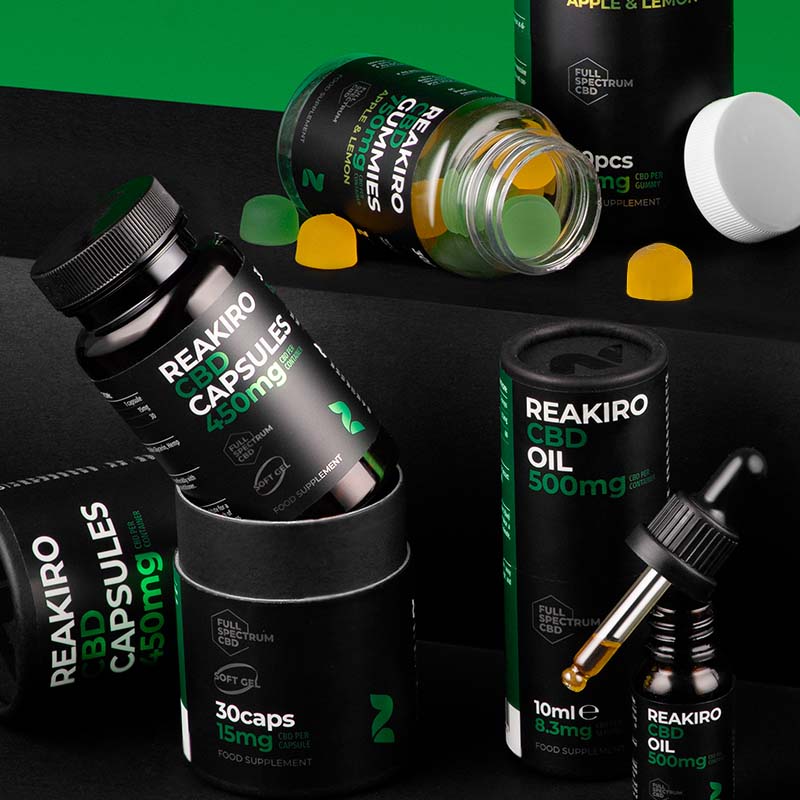Table of Contents
CBD is a well-known abbreviation for cannabidiol, a substance found in hemp plants that has no intoxicating or addictive properties. This natural plant compound is believed to have many health benefits. Taking CBD daily might have effects on the body without the 'high' feeling, but can you use CBD every day? Let's discuss the CBD benefits, physiological changes with CBD, and the safety of using cannabidiol regularly without harming health.
How Does CBD Work?
Cannabidiol, or in other words CBD, is a natural extract found in the cannabis plant that contains a high level of CBD and a low level of Delta-9-tetrahydrocannabinol or THC, the substance that causes the psychotropic effect. According to the World Health Organisation report on CBD and well-being, CBD is a safe substance that does not create any dependency.
But how exactly does it work? When CBD enters your bloodstream, it interacts with CB1 and CB2 receptors in the body. These can affect human health in different ways. While THC binds to these receptors directly, CBD modulates their activity.
CB1 Receptors: can be found in the brain and nervous system (central). THC binds to CB1 receptors, causing the effects of cannabis. CBD does not bind to CB1 receptors, but it can change how they work. It is thought that CBD acts as a negative modulator of CB1 receptors, changing the shape of the receptor and how it works. This modulation reduces THC's psychoactive effects and has potential therapeutic benefits.
CB2 Receptors: are located in the nervous system (peripheral), immune cells, and other peripheral tissues. CBD interacts with CB2 receptors indirectly. It is thought to influence CB2 receptor activity through various mechanisms, including inhibiting the breakdown of anandamide, an endocannabinoid that naturally activates CB2 receptors. CBD affects CB2 receptors indirectly by increasing anandamide levels. This can lead to anti-inflammatory, analgesic, and immunomodulatory effects.
Can I Take CBD Every Day?
As more and more people get familiar with the wellness benefits of CBD and incorporate CBD into their daily routine, whether to manage pain, reduce anxiety, improve sleep or for other reasons, understanding the health impact of CBD on the body becomes increasingly important, especially from the daily CBD use. Read personal experiences with daily CBD use here.
1. Anxiety Disorders
According to the newest researches, CBD could help alleviate various anxiety disorders and stress as it has anxiolytic properties. The 2020 study shows that CBD can make people feel less anxious in tests on animals and people. Even though CBD could be a novel treatment for anxiety disorders, further research is still needed to test CBD in other anxiety disorders in clinical trials, the impact CBD on stress and anxiety, determine the best way to take CBD and the correct dose and establish the efficacy long-term.
2. Sleep and Rest Quality
Many people find that CBD promotes better sleep quality. Daily use of CBD may lead to more restful nights, improved sleep patterns, and increased overall energy levels during the day. Preliminary research suggests that CBD may help with a number of sleep disorders, including insomnia. Research on CBD and sleep patterns is new and has given different results. More research is needed to understand the effects of cannabis on sleep in more depth.
3. Skin Conditions
The researchers assert that while CBD shows promise in treating conditions such as acne, seborrhoea, eczema/dermatitis and improving skin barrier function, further comprehensive studies are needed to confirm its efficacy conclusively.
4. Chronic Pain and Inflammation
CBD has also been extensively researched for its potential analgesic and anti-inflammatory properties. Numerous studies suggest a positive influence of CBD on various diseases; however, animal studies cannot always be extrapolated to human results. Although there are studies in healthy volunteers that demonstrate the safety and good tolerability of CBD, these CBD and inflammation studies do not examine long-term CBD usage, which is common in chronically ill people. Animal studies of chronic CBD treatment have lasted from several weeks to several months, which may reflect prolonged use in humans, but differences could not be ruled out.
How Much CBD Should I Take Daily?
If you search for CBD dosage on Google, you'll see different units and dosages for other products. Factors that affect the ideal CBD dosage include your:
- Health condition or problem.
- Metabolism.
- Body weight.
According to the above-listed factors, the recommended dosage is 10 mg to 100 mg CBD per day. Manufacturers suggest starting low, seeing how you feel, gradually increasing the dose, and monitoring your condition. Typically, CBD products come with dosage guidelines. These can be a good starting point, but your experience may vary, so adjust the dosage based on your needs. If you're not sure about the right dose of CBD, ask a healthcare professional who knows about CBD and how it affects other drugs or health problems.
Finding the right dose of CBD may take some trial and error. Adjust your dose and method of consumption based on your needs and responses.
Is CBD Not Working for You? Tips for Maximizing its Benefits
To get the most out of cannabidiol advantages, it's important to be consistent. This means having a regular schedule for taking CBD. This helps your body to build up a steady supply of cannabinoids and to experience the benefits over time. You can take CBD at any time of day, but it's best to be consistent. By following a regular CBD routine, your body can adapt to the compound's effects, making it more effective in addressing various wellness concerns.
Some people don't feel the effects of CBD right away, even if they use it regularly. If this happens, there are things you can do:
- ➤ Adjust Dosage: If this happens to you, try adjusting your dosage. Start with a low dose and gradually increase it until you find the right amount for you. It's a good idea to talk to a healthcare professional about this.
- ➤ Try different products: Not all CBD products are the same, and different formulations may have different effects. Try to experiment with different delivery methods such as oils, capsules, edibles, or topicals to see which works best for you. Additionally, consider trying products with different cannabinoid profiles or terpene blends to explore their potential effects.
- ➤ Give it time: Some people feel the effects of CBD right away, while others need more time for the compound to build up in their system. Be patient, be consistent and trust your CBD regimen.
- ➤ Consider bioavailability: The way CBD is absorbed into the body will vary depending on the method of consumption. For example, sublingual administration (under the tongue) usually results in faster absorption compared to oral ingestion. If you're not feeling the effects, try a different delivery method.
- ➤ Address underlying factors. If you're still not experiencing the desired effects, consider factors that may be affecting your response to CBD.
If you follow these tips and keep up your routine, you'll be more likely to see the benefits of CBD for your health and well-being. Listen to your body, track your progress, and talk to a healthcare professional if you have any questions or concerns.
In Conclusion
Without doubt, CBD has the potential to provide a range of health benefits without the intoxicating effects associated with THC. While daily use of CBD can provide benefits to the body without producing a 'high', it's important to consider dosage, method of consumption and individual response. From managing anxiety and improving sleep quality to potentially alleviating skin conditions and chronic pain, CBD shows promise as a natural supplement for overall wellbeing. However, more research is needed to fully understand its long-term effects and therapeutic potential. By maintaining consistency in use, adjusting dosage as needed, and understanding individual responses, people can maximise the benefits of CBD in their daily lives.



